
Faced with the crisis, inflation and the cost of living, can asylum seekers survive in Europe?

By late 2021, governments across Europe had barely eased their COVID-19 restrictions when the continent was gripped by a new problem: a cost-of-living crisis caused by rising prices and low wage growth during the last decade.
By 2022, the war in Ukraine threw global supply chains into further disarray, leading to rising inflation, writes Al Jazeera . In January this year, consumer prices in the United Kingdom rose by 10.1 percent and across the euro area by 8.5 percent.
The crisis has shown no signs of abating. But while there is ample evidence of how spiraling costs have overwhelmed low-income families across Europe, the extent and nature of their impact on asylum seekers and undocumented people – already victims of systemic inequalities – remains relatively unclear.
There are more than 2 million asylum seekers in the European Union alone, many of whom have undertaken treacherous journeys to escape conflict and persecution from countries such as Syria, Iraq and Afghanistan. They often lack access to key financial services and face severe legal and practical barriers to participating in the economy while awaiting decisions on their refugee status.
And in the UK, experts have warned that legislation to ban people who come to the country through irregular channels and stop them ever returning could expose desperate asylum seekers to further exploitation. economic and social.
So how bad are asylum seekers and undocumented people suffering from the cost of living crisis? Are certain groups particularly vulnerable?
The short answer: Food poverty and labor exploitation are hitting asylum seekers harder than citizens, researchers and advocacy groups told Al Jazeera. Women, especially mothers, have found their needs falling into the gaps. But these problems can be alleviated through a range of strategies aimed at socio-economic integration – and hopeful examples already exist.
Në Mbretërinë e Bashkuar, azilkërkuesit në përgjithësi ndalohen nga puna derisa të kenë arritur statusin e refugjatit. Nëse ata nuk marrin një vendim fillestar për kërkesat e tyre për azil brenda 12 muajve, ata mund të aplikojnë për punë vetëm në një listë të përcaktuar nga Zyra e Brendshme për mungesë në Britani, duke përfshirë infermierët, punonjësit socialë dhe inxhinierët.
Edhe pse Zyra e Brendshme thotë se kërkesat për azil përpunohen zakonisht në gjashtë muaj, shoqata bamirëse e Këshillit të Refugjatëve publikoi një raport në vitin 2021 që tregon se koha mesatare e pritjes edhe për një vendim fillestar ka të ngjarë të jetë një deri në tre vjet me disa që presin deri në pesë vjet. Grupet e avokimit vlerësojnë se kjo kohë pritjeje nuk është ulur që atëherë.
Asylum seekers who report that they are poor are provided with housing, but cannot choose where they live. They are entitled to a weekly payment of 45 pounds ($54) to buy essentials. It's a sum that amounts to 2,340 pounds ($2,808) a year.
What's worse, experts told Al Jazeera, is that there are usually long delays for asylum seekers to receive this help. Many wait up to a year.
Latest news


Durres Prison 'bastion' of the Socialist Party
2025-05-13 11:49:41
A house in Lezha is engulfed in flames
2025-05-13 11:36:28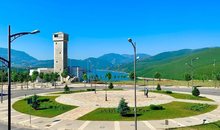

Our Putin!
2025-05-13 11:23:36

Kosovo Assembly fails to unblock, 15th session fails too
2025-05-13 10:58:49

Voting ends in Berat/ SP gets 5 mandates, DP-ASHM gets 2
2025-05-13 10:40:00
Kikia: Rama's fourth mandate a precedent for democracy
2025-05-13 10:28:22
Democrats win Kavaja convincingly
2025-05-13 10:21:00


US lifts temporary protection for thousands of Afghans
2025-05-13 09:44:52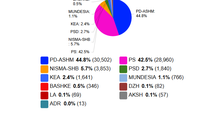
Overturning the result in Lezha, PD-ASHM secures 4 MPs
2025-05-13 09:44:00

Counting suspended in VIP prison, two more ballots found
2025-05-13 09:23:54
European leaders gather in Tirana in search of creative solutions for Ukraine
2025-05-13 09:11:52

Countdown nears, DP seizes lead in Shkodra and Lezha
2025-05-13 08:51:05
Result/ PS wins for the first time in Paskuqan
2025-05-13 08:39:26


Clear skies and cloudy skies, this is the weather forecast for Tuesday
2025-05-13 08:02:42
Morning Post/ In 2 lines: What mattered yesterday in Albania
2025-05-13 07:48:57

Vote counting in Mirdita concludes, DP wins convincingly
2025-05-12 23:40:46
Diaspora vote counting/ Observer - Ballës: Get out, you kicked us out of Albania
2025-05-12 23:27:36
Four almonds a day, 6 direct benefits to the body
2025-05-12 23:15:40
Vllaznia team 'doctor' arrested, dozens of fireworks found in his bag
2025-05-12 23:02:26
Denunciation/Electoral Reward for Noizy
2025-05-12 22:51:44
She won the mandate from the open list in Kukës, here is who Elvira Peka is
2025-05-12 22:38:39
Victory in Kukës, Flamur Hoxhaj: Fruit of the work and program we have done
2025-05-12 22:30:07
Tritan Shehu talks about the election result: Lazarati voted for the DP
2025-05-12 22:30:03
Trump may travel to Turkey for negotiations between Zelensky and Putin
2025-05-12 22:16:46
Counting ends in Kukës district, DP wins 2 mandates
2025-05-12 22:11:27
Egnatia is declared champion of Albania, ending Vllaznia's 24-year dream
2025-05-12 22:03:56


Albanian convict terrorizes prison in Greece, takes guards hostage
2025-05-12 21:36:15
Rama leaves headquarters, does not speak to journalists
2025-05-12 21:26:16
New report, old refrain
2025-05-12 21:18:59
DP gains advantage in Lezha, secures 4 mandates
2025-05-12 21:06:16
DP leads in Kavaja against SP
2025-05-12 20:57:52
In Shkodra, Vllaznia brings together the commissioners of the SP and the DP
2025-05-12 20:43:15
60% of votes counted across Albania, how mandates are distributed
2025-05-12 20:30:56

OSCE-ODIHR Report/ Media in Albania, collaborators of the government
2025-05-12 20:20:13
What would happen to your body if you slept less than six hours?
2025-05-12 20:08:27
Counting closes in Librazhd, how votes were divided between the DP and the SP
2025-05-12 20:02:24

Celibashi: Here's when we can have the final election results
2025-05-12 19:45:19
The May 11 elections, with old problems
2025-05-12 19:37:31
Source: DP should request the annulment of the elections
2025-05-12 19:25:20
From May 15, President Osmani begins efforts to unblock the Parliament
2025-05-12 19:18:39

Vllaznia-Egnatia is played today, Shkodra fans arrive at the "National Arena"
2025-05-12 19:03:11
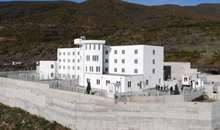
Even in the women's prison, the SP is voted for
2025-05-12 18:44:08
Accident in Laç, 84-year-old man taken to Trauma Hospital
2025-05-12 18:30:36
Counting continues in Tirana, Tabaku: Projection of mandates will change
2025-05-12 18:18:03

The Diaspora vote, a reflection of the elections within the country?
2025-05-12 17:59:12



The DP leads confidently in Fushë Krujë and Kamëz
2025-05-12 17:19:50



Number of diplomas declining, 9-year education most affected
2025-05-12 16:41:54
Leaving aside votes from Greece, CEC: They will not be excluded from the count
2025-05-12 16:31:53

They photographed ballots, two people are wanted in Tirana
2025-05-12 16:11:52
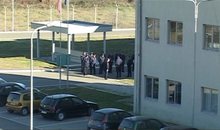
Prisoners choose Rama!? PS wins with 82% in Elbasan detention center
2025-05-12 15:55:19

Austrian tourist, injured in accident on Himara-Borsh road, dies
2025-05-12 15:37:14
The counting process in Cërrik ends, here's who won
2025-05-12 15:31:20

"There are violations!"/ Vote counting halted in CEAZ 17 in Klos
2025-05-12 15:11:41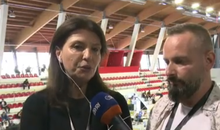


Who are the candidates of small parties who secure a seat in the Assembly?
2025-05-12 14:50:24
The elections were held under political patronage - organizations emphasize
2025-05-12 14:49:37
Berisha warns: The opposition will not turn a blind eye to violations
2025-05-12 14:28:33

Why did Rama grow up?
2025-05-12 14:11:37



Vote counting in Delvina closes, here are the results
2025-05-12 13:38:57
He is running on an open list, how many votes has Ilir Meta received so far?
2025-05-12 13:20:00



Vote counting in Fier suspended, process resumes tomorrow at 08:00
2025-05-12 12:24:35
Electronic voting results published in Vora, votes for each party
2025-05-12 12:10:03
In such elections, victory can only be Edi Rama's.
2025-05-12 12:01:10
